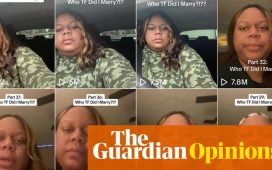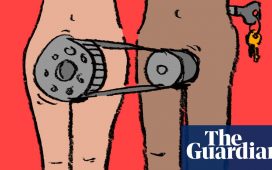My brother wants a girlfriend. He writes it on his Facebook wall and texts me most weeks to tell me this. The messages I receive late at night, the ones that say, “I’m lonely. Can you help find me a girlfriend?” are hardest to read.
Christian is a catch. He’s a radio DJ, he volunteers for a soup kitchen and campaigns for the homeless. He lives on the seafront in Brighton and can deliver a commentary on Love Island better than any media person I know. He’s sociable, handsome and has his own hair. He is 47 and is yet to met “the one”.
He has asked me to find him a dating site and set him up with a profile, which sounds simple enough – but the reality is different. Christian has a learning disability. As an adult who lives alone, who has no need for a care worker and enjoys a busy social life, Christian falls into a difficult gap in the dating scene. He is too vulnerable for conventional apps such as Tinder or match.com; but he doesn’t feel catered for by disability dating events and sites, either.
Generally, when Christian wants something, he can manifest it. He’s a hustler. He will casually drop into conversation that he has set up a choir or is helping to launch a club night. He persuaded a local pub to hold a speed-dating evening (although only two people turned up, so it didn’t quite take off). He was picked to be part of the relay team that carried the Queen’s Baton to the Commonwealth Games. He’s active in his community and knows his neighbours’ names.
I say all of this, not just because I’m a proud sister, but to show that Christian’s learning disability doesn’t hold him back from living a really full life. Generally, I don’t worry about him, but it’s hard to see that the one thing he wants – a girlfriend – he can’t seem to make happen.
He applied to be on the television show The Undateables twice, and was rejected twice. “You’re too dateable!” we tell him. “Why then,” he asks, “can I not get a girlfriend?”
He’s on two dating websites – Tinder and Badoo – but the process is gruelling. The shallow, disposable nature of online dating doesn’t really allow for honesty and conversation about disabilities. Christian’s is not a diagnosable condition; he can’t tick a box for autism or cerebral palsy, which means potential dates would have no point of reference even if he was open about his learning difficulty.
He does go on dates. Recently he set the family WhatsApp on fire by disappearing for the weekend with a woman he had met in a local cafe. He left his phone charger at home, which meant we couldn’t get through to him for nearly 48 hours. I’d like to say the family didn’t panic, but that’s not true. My sister and I were about to call the police when our cousin, who is close to Christian, said, “You have to let him go away for the weekend without getting the authorities involved.”
My cousin was right. Christian arrived home on the Sunday, blushing but happy.
That we were quick to assume he was in danger is telling. It’s worth considering how I would feel about him dating if he were a woman with learning disabilities. That the conversation about adults with disabilities dating quickly comes round to risk and safety doesn’t foster a healthy, thriving love life.
I recently tried to sign Christian up with Flame, the leading dating agency for adults with disabilities (they have made matches on eight series of The Undateables). I rang up to discuss the various membership packages (these start at £475), yet the matchmaker on the end of the phone told me that “a 47-year-old man looking for a woman would be very difficult to find a match for”. He couldn’t become a member. “We just couldn’t promise a match, so it wouldn’t feel right taking the money. There are no women near his age coming forward for dates.” This is a common issue; The Undateables says that 68% of applicants to the show are men.
Carol Wakeford and Diane Sharkey, who set up the inclusive dating agency Heart Venture, had the same problem: “At one point we had 100 men on our books and only three women.” They ended up refunding all their members, as they didn’t feel they could deliver on their promise to find them dates. “With the ladies, their family are always concerned about pregnancy,” Wakeford says. “I think that factors into whether they are encouraged to go on dates or not.”
Real or perceived issues to do with safety and risk continually get in the way of adults with disabilities living fun lives. Christian complains of his friends having to leave club nights at 8pm, as their support workers need to get back to change shifts. “It can be easier to protect people than support them to date, drink and go out,” says Paul Richards, director of Stay Up Late, a charity that promotes full, active lives for people with learning disabilities. It also provides guides to sex, relationships and alcohol. “Often the protection [of adults with disabilities] is well-meaning protection,” Richards says. “But what is the point of a safe life if it’s also a miserable one?”
Sometimes it’s hard for me to stand back and watch Christian arrange a date that I know will end in rejection. When I see posts on his Facebook wall from a woman asking him for money so she can fly to meet him, I’ll call my mum to discuss who should have the conversation about scammers. Knowing when to step in and be the killjoy, and when to stand back and let him learn the hard way, is a delicate dance. How do you explain to someone that relationships don’t just bring happiness? That they bring heartbreak, conflict and awkwardness, and that’s only once you’ve got past the scammers, fake accounts and rejection.
When will Christian get a girlfriend? I don’t know. He’s not going to stop trying, though. Last week he joined a wheelchair basketball team, having never used a wheelchair or played basketball; I can’t think of a better metaphor for his optimism and willingness to persevere.
As I’m typing out my final thoughts on Christian’s next chapter (and closing the porn pop-ups that appear when you have 10 tabs open on different disability dating websites), my phone buzzes. It’s a text from Christian: “How was your day then? I went out with a girl I volunteer with. We went for a drink.”
I feel familiar emotions – optimism tempered with caution. I reply: “Brilliant! What’s her name?” Maybe he doesn’t need my help after all.
• If you would like a comment on this piece to be considered for inclusion on Weekend magazine’s letters page in print, please email weekend@theguardian.com, including your name and address (not for publication).














